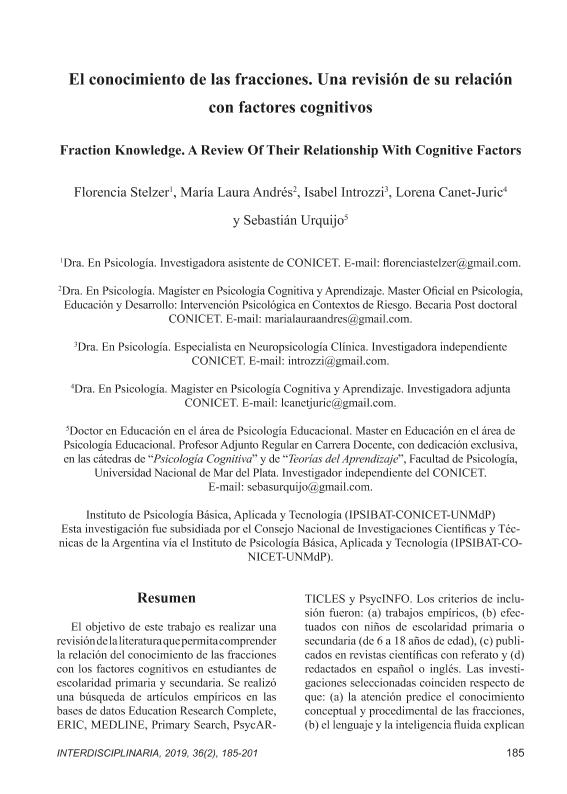Artículo
El objetivo de este trabajo es realizar una revisión de la literatura que permita comprender la relación del conocimiento de las fracciones con los factores cognitivos en estudiantes de escolaridad primaria y secundaria. Se realizó una búsqueda de artículos empíricos en las bases de datos Education Research Complete, ERIC, MEDLINE, Primary Search, PsycARTICLES y PsycINFO. Los criterios de inclusión fueron: (a) trabajos empíricos, (b) efectuados con niños de escolaridad primaria o secundaria (de 6 a 18 años de edad), (c) publicados en revistas científicas con referato y (d) redactados en español o inglés. Las investigaciones seleccionadas coinciden respecto de que: (a) la atención predice el conocimiento conceptual y procedimental de las fracciones, (b) el lenguaje y la inteligencia fluida explican el conocimiento conceptual de las fracciones en la etapa inicial de su enseñanza sistemática y (c) el ejecutivo central contribuye a la predicción del conocimiento conceptual de las fracciones en años avanzados de la escolaridad. Se discuten las implicaciones teóricas y prácticas de estos resultados y se señalan posibles líneas de investigaciones futuras. Learning fractions presents large difficulties for many children and adults. This is a serious problem, because different studies have shown that fraction knowledge predicts advanced mathematics, like algebra. Adult mathematic knowledge is related to employment opportunities, participation in highskills occupations and economic and social well-being. Therefore, since fractions represent a backbone in mathematics achievement, understanding the factors that explain fractions learning is very important. Some theories of numerical cognition propose that general cognitive factors, like attention or working memory, contribute to learning mathematics. However, recent research has shown different and contradictory results about which cognitive factors are involved in fraction learning. Identifing the cognitive factors that explain fraction knowledge could lead to early identification of children with potential math learning difficulties and the development of interventions to improve their achievement. Therefore, the aim of this article is to perform a systematic literature review to analyze the relationship among some cognitive factors and fraction knowledge. A systematic literature search could define the state of the art on this topic, identify possible sources of controversy among studies, analyze those reasons to recognize points of agreement and discrepancy among studies and direct all this information towards future research lines.
El conocimiento de las fracciones. Una revisión de su relación con factores cognitivos
Título:
Fraction Knowledge. A Review Of Their Relationship With Cognitive Factors
Stelzer, Florencia ; Andrés, María Laura
; Andrés, María Laura ; Introzzi, Isabel Maria
; Introzzi, Isabel Maria ; Canet Juric, Lorena
; Canet Juric, Lorena ; Urquijo, Sebastian
; Urquijo, Sebastian
 ; Andrés, María Laura
; Andrés, María Laura ; Introzzi, Isabel Maria
; Introzzi, Isabel Maria ; Canet Juric, Lorena
; Canet Juric, Lorena ; Urquijo, Sebastian
; Urquijo, Sebastian
Fecha de publicación:
08/2019
Editorial:
Centro Interamericano de Investigaciones Psicológicas y Ciencias Afines
Revista:
Interdisciplinaria
ISSN:
0325-8203
Idioma:
Español
Tipo de recurso:
Artículo publicado
Clasificación temática:
Resumen
Palabras clave:
Aprendizaje
,
Cognición
,
Fracciones
,
Matemáticas
,
Números racionales
Archivos asociados
Licencia
Identificadores
Colecciones
Articulos(IPSIBAT)
Articulos de INSTITUTO DE PSICOLOGIA BASICA, APLICADA Y TECNOLOGIA
Articulos de INSTITUTO DE PSICOLOGIA BASICA, APLICADA Y TECNOLOGIA
Citación
Stelzer, Florencia; Andrés, María Laura; Introzzi, Isabel Maria; Canet Juric, Lorena; Urquijo, Sebastian; El conocimiento de las fracciones. Una revisión de su relación con factores cognitivos; Centro Interamericano de Investigaciones Psicológicas y Ciencias Afines; Interdisciplinaria; 36; 2; 8-2019; 185-201
Compartir



